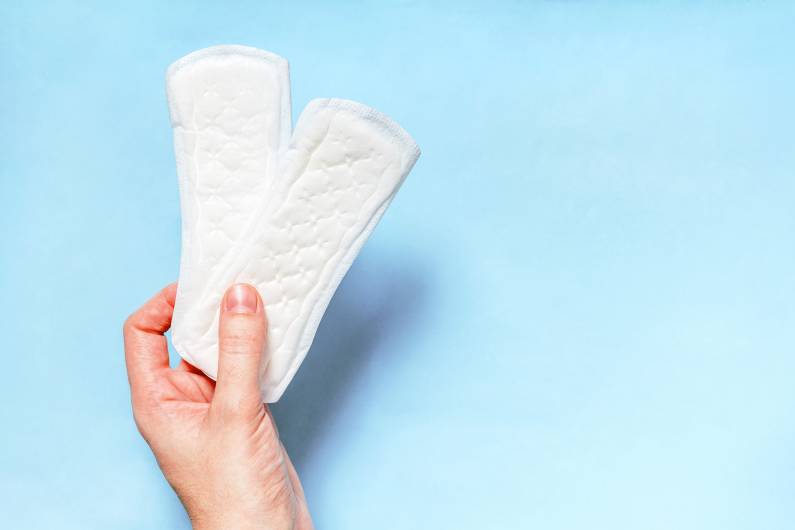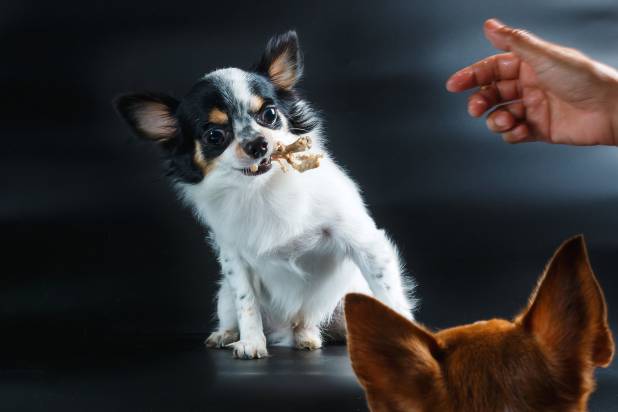Connect with a verified veterinarian in minutes. Licensed vets are available 24/7 to answer your questions. No need to worry about your furry family member.
Dogs can surprise us with what they choose to eat! And they seem to eat just about anything. Some choose to eat garbage; at least that’s logical! They smell food and get hungry. There’s a free source of extra yummies for them! But other dogs are determined to eat rocks, paper, and more. Then there are dogs that eat something like a panty liner! Yuck! But what happens if a dog eats a panty liner? Will he get sick?
Has your dog eaten a panty liner? Are you worried the panty liner will make your dog sick? If so, you’ve come to the right place. We understand it can be scary when your dog eats something like this.
We’ve put together information about panty liners and whether they can make a dog sick. Let’s get started!
What is a Panty Liner?
A panty liner is a small piece of absorbent material used for feminine hygiene during menstruation. The panty liner is placed at the bottom of a panty, where it can absorb liquid. They can also be helpful for spotting, urinary incontinence, or vaginal discharge. The liners are held in place by adhesive on the back of the pad.
These items are very similar to menstrual pads; however, panty liners are thinner and don’t hold as much liquid as a regular pad. Panty liners come in different shapes and sizes.
So, what happens if a dog eats a panty liner? Can the panty liner make a dog sick?
Panty Liners & Dogs
Unfortunately, panty liners can make a dog sick. The liners are not toxic; however they could potentially make your dog cause a problem if they obstruct his digestive system.
While panty liners are thinner and smaller than regular pads, a dog could become sick if it gets lodged somewhere in his stomach or intestines. This is more likely to happen in a small dog or in any dog that has eaten more than one panty liner. If this happens then your dog could become very unwell, even requiring surgery to correct the issue.
It’s also possible that the panty liner could travel safely through a dog’s digestive system and come out in his poop, particularly if he is a larger breed.

Review symptoms, medications & behavior to keep your pets healthy with a Vet Online in just minutes.
Ask a Vet Live NowWhat to Do If Your Dog Has Eaten a Panty Liner
There are many variables to this issue, so we strongly recommend calling your vet right away. They have the knowledge and expertise on the best way to help your dog. So, be sure to follow your vet’s advice on what needs to be done for your fur baby.
And in the future, make sure to keep all panty liners out of your dog’s reach. If he dug the liners out of the trash, it might be helpful to invest in a dog-proof wastebasket to avoid this problem in the future. We always say prevention is the best medicine!
Connect with a verified veterinarian in minutes. Licensed vets are available 24/7 to answer your questions. No need to worry about your furry family member.

Rebecca MacMillan, BVetMed BSAVA PGCertSAM MRCVS
This article has been reviewed and approved by an independent Veterinarian: Rebecca is a companion animal vet who has always had a passion for writing and client communication. Since her graduation from the Royal Veterinary college in 2009 she has gained a wealth of experience in first opinion small animal practice, in both clinical and managerial roles. She currently works in the South West and deals with a variety of routine and emergency appointments, but particularly enjoys medicine cases. Outside of work and writing, she enjoys spending time with her family, including her bouncy flat coated retriever George!
Review symptoms, medications & behavior to keep your pets healthy with a Vet Online in just minutes.
Ask a Vet Live Now






